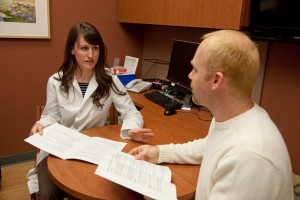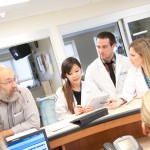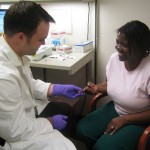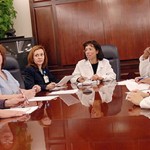
University of Wisconsin Hospital and Clinics, Madison, won the 2011 award for its innovative anticoagulation stewardship program. Above, Philip Trapskin, Pharm.D., BCPS, confers with Anne Rose, Pharm.D.
NO ONE KNOWS MEDICATION SAFETY like a pharmacist, and the ASHP Research and Education Foundation’s Award for Excellence in Medication-Use Safety has showcased many of the best programs in the country since its launch a decade ago.
“This award is associated with projects that help to expand the role of pharmacists. It’s a model for showcasing pharmacists’ abilities to lead interprofessional teams to yield organization-wide, safety and quality initiatives,” said Stephen J. Allen, R.Ph., M.S., FASHP, the Foundation’s chief executive officer.
Supported by a grant from the Cardinal Health Foundation, the award provides $50,000 each year to a pharmacist-led multidisciplinary team for implementing significant institution-wide system improvements relating to medication use. Two finalists also receive $10,000 each.
Since the first award was given to OhioHealth in Columbus for its adoption of mechanisms to consistently identify adverse drug events and provide a platform for best practices across the system, the number of applications has climbed steadily to more than 30 per year, and the types of programs recognized have expanded from medication reconciliation to include a range of care areas such as post-discharge follow-up, anticoagulation stewardship, post-transplant care, diabetes care, and oncology.
As pharmacy practice and health care have evolved, the award has evolved with the work becoming sophisticated with significant impact and touching all areas of healthcare,” said Dianne Radigan, vice president of community relations at Cardinal Health.
Assessing Success
To win the award, a program or initiative must be able to provide evidence that it has improved medication-use safety and patient care. There must be quantifiable outcomes, and the applicant must be able to record specific, concrete ways that pharmacists and other members of a multidisciplinary team have worked together to produce the best patient outcomes.
Amassing the data provides an opportunity to assess the success of a program, said Teri B. Cardwell, R.Ph., Pharm.D., M.H.A., senior director of population health at Novant Health in Winston-Salem, N.C. Novant won the award in 2008 for its outpatient medication reconciliation program for patients older than 65.
“It’s interesting to write it all down and see it in front of you,” Cardwell said. “We thought we were doing well, but when we got someone to run the numbers and look at the program more in depth, we learned just how much we’d done, and where we might want to go next.”
[The award] shows physicians and surgeons what a great resource they have in pharmacists and how pharmacists optimize care and help patients understand their medications.
Winning the award provided a boost to the team at the Medical University of South Carolina in Charleston, honored in 2010 for its initiative to decrease length of stay, preventable re-admissions, and adverse drug events for kidney transplant patients. The award brought the team recognition within their health system and landed them another award, this time from the hospital itself, to extend the initiative to other hospital services.
“Because this is a multidisciplinary process, the Award for Excellence in Medication Use Safety highlights to hospital leaders outside pharmacy how pharmacists can affect outcomes directly,” said Nicole A. Weimert-Pilch, Pharm.D., MSCR, BCPS, clinical specialist in solid organ transplantation and clinical assistant professor.
“It shows physicians and surgeons what a great resource they have in pharmacists and how pharmacists optimize care and help patients understand their medications. The process is worth the application in and of itself. Even if you don’t get nominated or win, it highlights your program to internal leaders.”
James Rudolph, M.D., M.S., chief of geriatrics at the Boston VA Healthcare System, can vouch for that. The Boston VA won in 2012 for its Pharmacological Intervention in Late Life (PILL) Service, in which pharmacists conduct medication reviews and follow-up calls with older adults, particularly those with cognitive impairment. Rudolph said that working with the team drove home for him how important pharmacists are to such efforts.
“It’s critical to have a pharmacist involved. PILL never would have taken off without one,” he said, noting that the award has enabled the program to expand its reach and work with other groups of patients.
Rudolph said that physicians can learn more from pharmacists than any other specialty or discipline. “We don’t get enough pharmacology training in med school. It’s a learning process when you start practicing, and it’s eye-opening when you take care of a patient who is on 15 meds and see how a pharmacist can improve care.”
Leading the Profession to New Heights
Anne Rose, Pharm.D., anticoagulation stewardship program coordinator at the University of Wisconsin Hospital and Clinics in Madison, which won in 2011, points to the value of the national recognition that comes with award.

Above, Erin Robinson, Pharm.D., CACP, with University of Wisconsin Hospitals and Clinics, counsels a patient.
“We had a great year after we won, going on the radio media tour and speaking about our programs and anticoagulation needs in general,” she said. “It’s more than the award itself. It’s being able to meet others doing similar things or who want to do what you do, so you can share it with them.”
She said the publicity can only help the profession as a whole. “It goes to show how far we have come and how we are branching out. Hopefully, being able to show how we can provide care, lead medication management programs, and work beyond traditional pharmacy roles will help us attain provider status.”
Advancing the pharmacy profession comes back to the increasing sophistication of pharmacist-led programs, said Daniel D. Degnan, III, Pharm.D., M.S., CPPS, senior project manager at Purdue University’s Center for Medication Safety Advancement in
“We see programs from all over the country that are on the cutting edge of medication safety. There is a diversity of projects, but also of the types of organizations that apply, from large systems that cover big geographic areas to smaller, more traditional hospitals.”
These programs demonstrate leadership, Degnan added. “When we do site visits, we see people who are passionate about pharmacy and medication safety. These are typically great pharmacists who are active in their professional associations.”
That kind of enthusiasm is crucial to driving change in the profession, said Allen, noting that the award reflects a key goal of ASHP’s Pharmacy Practice Model Initiative.
“We want to help systems across the country expand pharmacist responsibilities and broaden pharmacists’ direct patient care, so they are not in the basement, but working with physicians and nurses,” he noted.
“You can’t change pharmacy practice without leaders, and by recognizing the impact pharmacists have on coordinating quality, process, and project improvement design, this award is a wonderful showcase for the many ways in which pharmacists can lead improvements in patient care.”
By Terri D’Arrigo
[youtube dpzB_4w3okg]









 If you want to contribute tutorials, news or other stuff please contact us. We pay 150 for each approved article.
If you want to contribute tutorials, news or other stuff please contact us. We pay 150 for each approved article. Consectetur adipisicing elit. Sed do eiusmod tempor incididunt ut labore.
Consectetur adipisicing elit. Sed do eiusmod tempor incididunt ut labore. This site uses valid HTML and CSS. All content Copyright © 2010 Newscast, Inc
This site uses valid HTML and CSS. All content Copyright © 2010 Newscast, Inc If you like what we do, please don't hestitate and subscribe to our
If you like what we do, please don't hestitate and subscribe to our